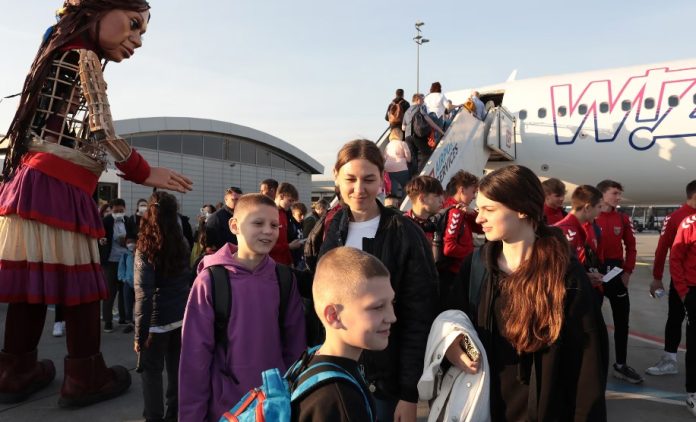French authorities are evicting Ukrainian refugees from housing provided to them two years ago for free, Le Monde reports.
In the Grand Est region, Ukrainian refugees are receiving letters demanding that they leave their allocated flats due to a lack of integration, which has enraged Ukrainian associations.
Olesya Bolgunovskaya speaks French very tentatively. But when the 41-year-old Ukrainian was asked how she felt when she received a letter on October 7 demanding that she vacate her rented flat in Thionville (Moselle), the answer came right off her lips:
It was shock, panic.
The Kharkiv-born woman left Ukraine in March 2022 with her 63-year-old mother and 11-year-old son. She stated:
Volunteers took us from the Polish border to Luxembourg. From there we travelled to Thionville, where I had a friend staying. At first I didn’t make too much effort to integrate into society. I thought the conflict wouldn’t last. But it’s not going to end, and the situation in Kharkiv is getting more tense every day.
Since the end of September, dozens of displaced people in the Grand Est region have received demands to leave the accommodation provided to them by accommodation associations. The letters typically specify a deadline of October 31, the day before winter break begins. Representatives of Ukrainian associations recognise that in other regions “the transition to a different type of accommodation has gone smoothly, without much stress,” but note that in the east of the country “support through integration has not been finalised.”
Special status for Ukrainian refugees
Local accommodation associations, the authors of the eviction letters, claim to be acting at the request of public services. Some of the letters outline the reasons for this decision. a letter signed by the Association for Reception and Social Reintegration of Mörth and Mosel reads:
The necessary steps for professional integration and self-sufficiency have been taken without sufficient diligence, which makes it impossible to include you in a large-scale integration programme.
The document goes on to ask refugees to find a suitable housing solution on their own:
Otherwise you may be referred to an orientation session for emergency accommodation – subject to availability.
Ukrainian refugees have a special status in the EU: they receive a temporary residence permit. France provides them with accommodation through an intermediary rental scheme: thanks to government subsidies, associations rent the flats they provide to displaced people. The prefecture of Meurthe and Moselle reminds:
This is a temporary measure and the person who receives housing in this way undertakes to do his or her utmost to find a permanent place of residence, since the State has no obligation towards such people to provide them with permanent housing.
Of the 1,600 refugees living within the department, only 591 continue to benefit from this support measure. There are 228 accommodation facilities participating in the programme.
Vulnerable situation
Violeta Moskalu with despair in her voice said:
This inhumanity and pressure is simply appalling.
The chairwoman of the association “Échanges Lorraine-Ukraine” addressed a letter to the highest officials of the country and informed the media. In the prefectures of Moselle and of Meurthe and Moselle, her act caused some embarrassment, but they continue to send out messages that keep their wording firm. The prefecture of Murthe and Moselle said it “recognises that in some cases the process may have stalled for a number of reasons,” but notes that “some families have not taken advantage of the support offered to them.”
On Monday, the prefectural leadership received representatives of two associations, two human rights defenders and the department’s union of family associations. At the meeting, the municipal authorities gave assurances that no one would come to evict Ukrainians renting social housing before the winter break. The parties also discussed ways to help as many refugees as possible achieve housing self-sufficiency before the end of the year.
Olesya says she is completely confused. In Kharkiv, she worked as a production manager at a printing company; she was unable to find a similar position in Lorraine. Putting her employment attempts on hold, she is studying French and has gone to the School of Management in Metz. But the threat of being out on the street forces her to look for a job in any sector:
If I had known before, I wouldn’t have gone to school. It would be difficult to combine everything at once.
She cannot apply for asylum, which seems to be the option favoured by the prefectures – in this scenario, refugees are obliged to stay in France:
Then I won’t be able to visit my family in Ukraine.
Violeta Moskalu also can’t calm down. She said:
Two thirds of the refugees who have not integrated are vulnerable because of age, illness or small children. We cannot treat them so negligently. And we need to remove administrative barriers to their employment. The current status does not allow young Ukrainians to get a driver’s licence or undergo certain educational programmes. Doctors cannot get the right to conduct appointments.
EU phasing out aid
More than two and a half years after the start of the military conflict in Ukraine, the idyll between France and Ukrainian refugees, which was greeted with such enthusiasm, seems to be fading. Some countries – including Norway, the Czech Republic, Hungary and the Netherlands – are beginning to restrict Ukrainians’ right of entry or social benefits. Cost-conscious France has now joined the list.
Earlier, German Finance Minister Christian Lindner announced the forthcoming changes in the system of social assistance for Ukrainian refugees. In particular, he proposed to stop paying the civilian allowance (Bürgergeld), which Ukrainian refugees have been receiving since June 2022.
